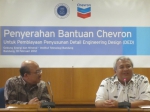The Minister of Energy and Mineral Resources, Arifin Tasrif Invites Students to Support The Energy and Mineral Resources Strategic Program

BANDUNG, itb.ac.id - Energy resources is an important sector that must be well-managed by the state. Indonesia has to become energy-independent by using a variety of available resources. By becoming energy-independent, we will no longer depend on imports that drain our country's foreign exchange. This was explained by the Minister of Energy and Mineral Resources of The Republic of Indonesia, Arifin Tasrif, in the Studium Generale KU-4078 in the West Hall of Institut Teknologi Bandung (ITB), Wednesday (4/3/2020).
This lecture was attended by more than 589 students. It was opened by the Vice Chancellor for Academic and Student Affairs, Prof. Dr. Ir. Jaka Sembiring, M.Eng. In his opening speech, he conveyed that this 21st century was marked by a war of information, food, and energy. The whole country would spend all its efforts to win this competition. He also points out that by 2030 Indonesia is predicted to have a demographic bonus. Consequently, the needs of energy will increase and urgently needed. Therefore, we as college students must prepare early to face the future. "This lecture will help students in planning the future and contribute to create a better life for our nation," he said.
Arifin Tasrif is an ITB ‘72 alumni who previously also served as Director of PT. Industrial Engineering and Indonesian Ambassador to Japan. The theme of his lecture was titled "Energy and Mineral Resources Strategic Policies and Programs." In Arifin Tasrif opinion, energy and mineral resources sector policies are focused on sustainable and equitable energy development to support economic growth and encourage industrial development. The policy direction will be prioritized on the availability of energy by optimizing the use of Renewable Energy.
"Social justice in the energy sector will emphasize the availability of energy at affordable prices and environmentally friendly extractive activities. The key is how we treat the resources. We hope that this special force (student) can create a technology that increases the energy added value so that we not only export the raw goods but process them first. And we must also be able to learn from other countries such as Korea, Japan and China that have been successful in the energy sector, then apply as the same in Indonesia, "said Arifin Tasrif.
In his presentation, Arifin Tasrif conveyed that there are at least seven development agendas that refer to the President's vision and mission in the energy sector, including:
1. Strengthening economic resilience for quality growth;
2. Developing areas to reduce inequality;
3. Increasing quality and competitive human resources;
4. Mental revolution and cultural development;
5. Strengthening infrastructure to support economic development and basic services;
6. Building the environment, increasing disaster resilience and climate change;
7. Strengthening the stability of law and security and public service information.
He also kept going on to explain, in strengthening economic resilience and reducing inequality, the government began processing Indonesian mining products. So that we are not only selling raw goods, but the one which has gone through a process in order to increase our product added value. This processing will open jobs and increase foreign exchange. In addition, said Arifin Tasrif, in developing policies and reducing disparities, the government will implement a one-price level fuel so that the price of fuel is evenly distributed throughout Indonesia. To improve quality and competitive human resources, the government is currently focusing more on training in the industrial sector located in Cepu.
"Another aspect that has also become a priority for the government is the development of renewable energy by utilizing natural resources such as wind, water and geothermal. The potential reaches 400 gigawatts, while currently we only use 13.4% of them. The government also hopes that in the future, we can use renewable energy to replace import and bioenergy dependencies. It also may substitute the usage of bio carbons that is predicted will be soon depleted, "Arifin Tasrif said.
Not only focusing on the energy aspect, explained Arifin Tasrif, the government is also very concerned about the environmental issue. Therefore, a clean environment is the key to life in the future. The government is encouraging companies to reclaim ex-mining by imposing regulations to plant trees in ex-mining areas. And also, now the government is starting to look at electric vehicles as environmentally friendly future vehicles.
Reporter: Deo Fernando
Translator: Evita Sonny

scan for download







